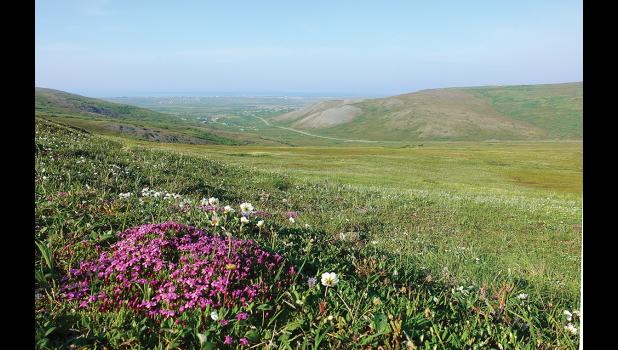Region’s villages remain vigilant to keep virus out
The villages of the Bering Strait/Norton Sound region are staying locked down in an effort to block the spread of COVID-19. Even before last week’s appearance of the first case in a village, the rules about travel and quarantine were being enforced. As the first case in a village was announced on June 13, the effort to keep the virus out has regained strength.
Little Diomede is isolated but has people flying in and out on the Pathfinder Helicopter, mostly for medical appointments in Nome. If Diomede residents are traveling back to the island, they have the option of a seven-day quarantine in Nome with a virus test and then seven days in Diomede quarantine with another test or a 14-day quarantine in Nome before the helicopter ride to the island. For those in quarantine there is a special time set aside at the washeteria on Thursdays. They are able to shower. There are disinfectants at hand to wipe down with after they use the facilities. After they left the washeteria, the monitor comes in to do a thorough wipe down. The city recently passed a resolution that precludes boats from other villages to land on the island. To protect the local people from COVID-19, private boat owners are not permitted to land. On Sunday morning some boats landed and people went into the village, despite being told by a local official that it was not permitted.
In St. Michael the routine has not changed “It’s still the same,” said Richard Elachik Sr. of travel in and out of the village. “As long as they get their testing done and make their travel plans ahead of time.”
Paul Nagaruk, Mayor of Elim, sees lots of travel. “I’m not sure if it’s essential,” he said. “They’re mainly clinic checkups or overseeing results from previous checkups.” Mostly people go to Nome but a few travel to Anchorage. “We’re almost a regular village except with some cautions,” he said. “We’re trying to keep people restricted in the stores but it’s getting out of hand.” People aren’t wearing masks. “We’ve got people interacting with other villages even,” he said. “Because it’s just human nature.” Subsistence is proceeding normally. There are people who land in a different village and then boat in to Elim.
“They’re still recommending no travel unless it’s for medical or essential workers,” said Sophia Kachatag of Shaktoolik. “The other week we updated our mandate and we were letting villagers from the Bering Strait region come in without quarantine. But that might change tomorrow when they have a meeting.” What about supplies in the store? “Well, at the beginning it was a little sketchy,” she said. “But with hardly any passengers the planes are able to bring in a lot more mail and freight. It hasn’t been bad.”
From Stebbins, Miranda Charlie reports things are normal. “People are still flying out for medical reasons, mostly to Nome,” she said. The stores have been short on inventory. “They run out and the freight comes in a little late.” Testing is available at the Stebbins clinic.
Wales is allowing no inter-village travel. Hunters going out are supposed to carry personal protection equipment. People in the village still wear masks and practice social distancing. Medical travel is normal and when in Nome Norton Sound Health Corporation makes sure they get tested. The stores stay stocked up thanks to Bering Air and Ryan Air. “We’re very thankful for them,” said Ellen Richards of the Wales IRA. Boxes of freight are quarantined for 24 hours before being available for purchase. When going to the Corporation store, people wear masks and gloves and only one is allowed in the store at a time. At the Native store two customers are allowed in but they wear masks and gloves also. Richards agrees that they are strict. “Oh, we are. We’re such a small village. We’re being very cautious because of the 1918 flu epidemic.” A mail carrier brought the Spanish flu to Wales back then. “The population was 600 and went down to 134. The older children were told to take care of the little ones so they wouldn’t be taken out of the village. So we’re being very cautious as far as our mandates,” said Richards.
In White Mountain, those traveling for medical appointments do their quarantine when they return. The store is keeping up with the needs of the village, according to City Clerk Amy Titus. Subsistence hunting is normal. “Usually you only go out with your household when you go subsistence,” she said. “There’s a lot of space out there. Pretty easy to stay away from people. Everybody wishes it would end but everybody understands why it’s in place.”
With a 72-mile road to Nome Teller’s situation is unique. “We can’t do much about it,” said Cora Ablowaluk. People who travel by plane still need the proper forms filled out. But there’s no control on the road. Teller residents drive to Nome to shop because the Teller store is bare. Subsistence is proceeding as normal, reports Ablowaluk.
According to a report given during the daily tribal leadership call, NSHC reports that tests are conducted in every village. The following percentages are residents tested for the coronavirus: Brevig Mission 18.4 percent, Elim 19.8 percent. Gambell 14.7 percent, Golovin 26.9 percent, Koyuk 17.8 percent, Little Diomede 22.7 percent, Nome 39.9 percent, St. Michael 22 percent, Savoonga 17 percent, Shaktoolik 12.8 percent, Shishmaref 15.6 percent, Stebbins 12.4 percent, Teller 27.4 percent, Unalakleet 17.6 percent, Wales 25.8 percent, White Mountain 28.1 percent.

